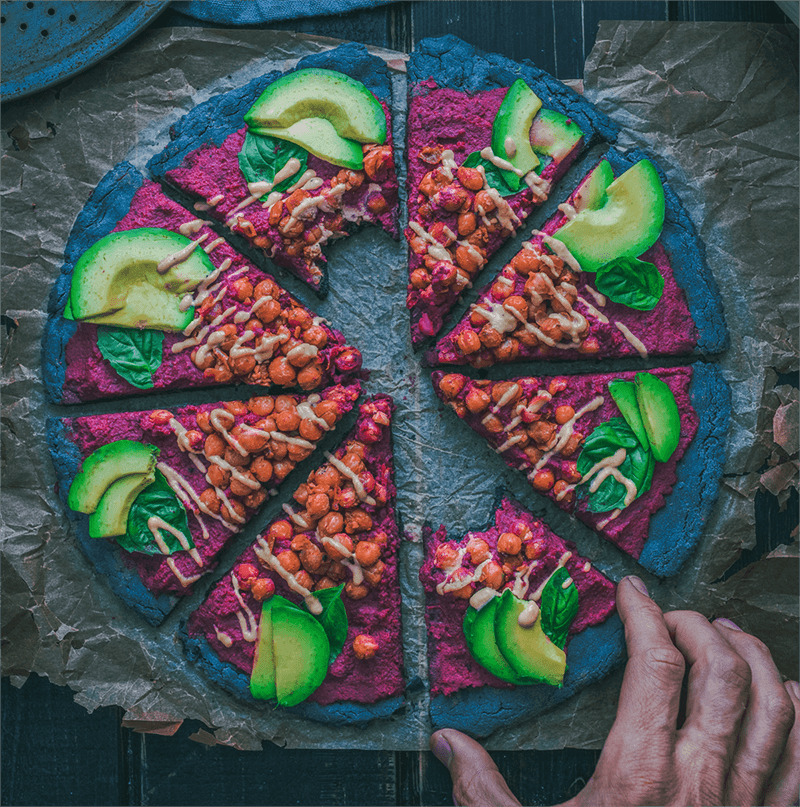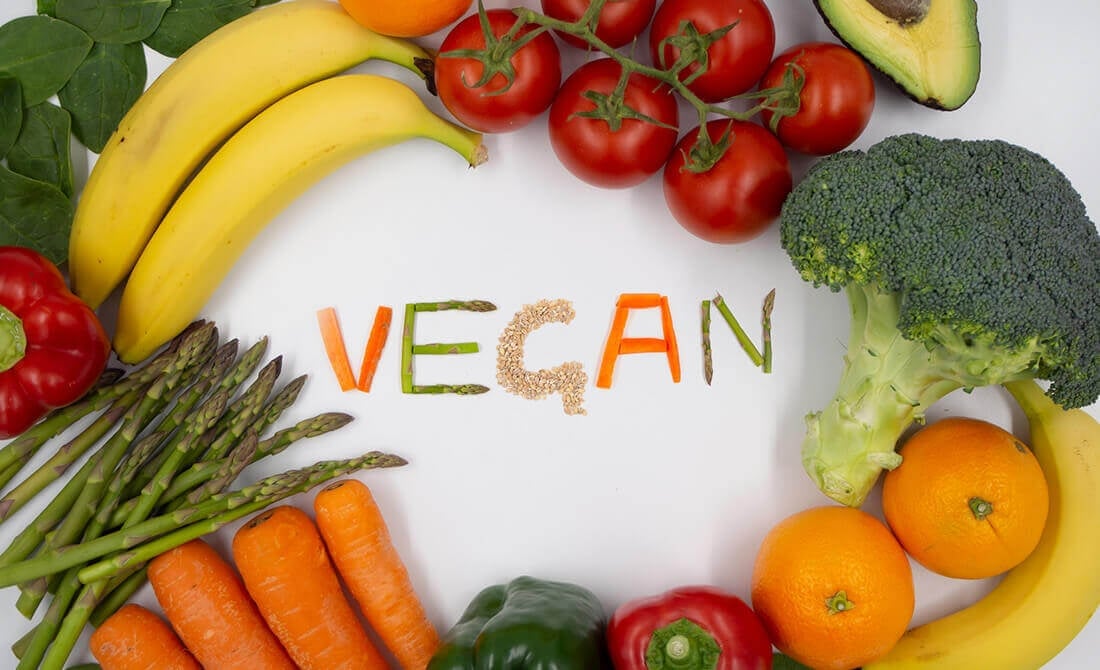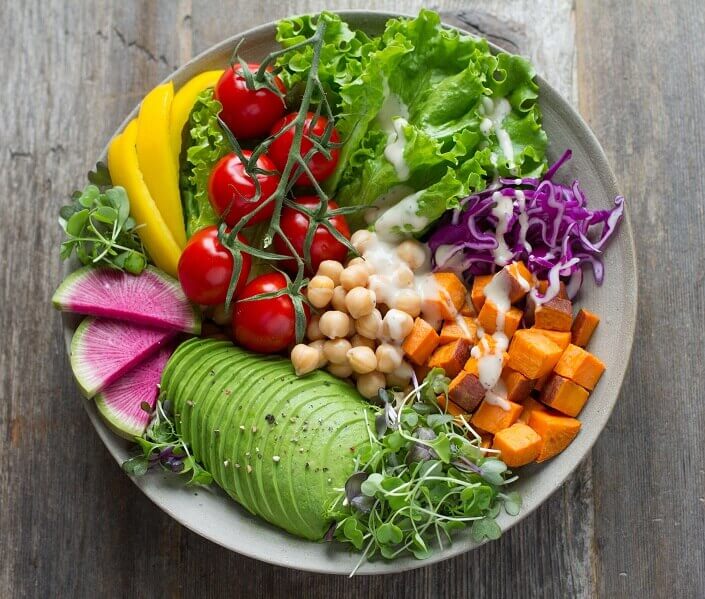8 mins read
Veganism Statistics UK 2019

Vegan options are now available in most restaurants and even some popular high street food outlets are offering vegan alternatives. But how healthy are vegan individuals? We delve into the key veganism statistics to find out.
Summary Of Survey Results
We used a combination of our own internal data, external data and Google Search data for this piece of research.
The key findings in summary:
- Our research backs up scientific data which states young vegan women are at the greatest risk of iron deficiency. Female vegans/vegetarians had the lowest result for average ferritin levels.
- We found little difference between vegans and non-vegans in terms of vitamin B12 and vitamin D levels. Vegans had higher folate levels than non-vegans.
- ‘Vegan recipes’ was searched 40,300 times in February 2018 and January 2019. The ‘Veganuary’ campaign may have played a significant role in this trend.
How many people in the UK are vegan?
According to the Vegan Society, there are 600,000 vegans in the UK compared to just 150,000 in 2014. The UK has launched the most vegan products than any other country.
Are vegans healthy?
There has been much speculation about whether vegans and vegetarians are at a greater risk of certain nutrient deficiencies, particularly vitamin B12, vitamin D, iron and folate. We look at some of the data we have collected to see if vegans are at a greater risk compared with the general population.
Vitamin D
Vitamin D deficiency is not unique to the vegan diet. However, there have been multiple studies which state vegans have a lower intake of both calcium and vitamin D. Our results show that vegans and vegetarians were at the same risk of low vitamin D levels as the rest of the population. Equally, their average results were in line with males and females from the general population.
Vitamin D is not just acquired from the diet. The best way for the human body to get the vitamin D it requires is through sunlight exposure. Therefore, if individuals do not get adequate sunlight exposure they are at greater risk. For that reason, the populations of countries including the United Kingdom who are considered mid-latitude European countries, have a greater prevalence of vitamin D deficiency.
Table 1. Vitamin D reference ranges
| Reference range | Reference range | % low or borderline low vit. D levels | |
|---|---|---|---|
| Male | 50-175 | 73.18 | 21.49 |
| Female | 50-175 | 68.82 | 27.96 |
| Vegan/vegetarian | 50-175 | 71.2 | 27.82 |
Source: Forth
Vitamin B12
Vegans and vegetarian diets are risk factors for vitamin B12 deficiency because it is mainly derived from fish, meat and dairy products. Therefore, vegans, particularly, need to ensure they eat foods which are fortified with vitamin B12 like fortified plant milk, cereals and bread.
Our results show a higher proportion of vegans/vegetarians have low or borderline low vitamin B12 levels. However, their average results still fall within the reference range.
Table 2. Vitamin B12 reference ranges
| Reference range | Reference range | % low or borderline low B12 levels | |
|---|---|---|---|
| Male | 37.5-190 | 108.84 | 2.07 |
| Female | 37.5-189 | 106.85 | 3.52 |
| Vegan/vegetarian | 37.5-188 | 102.13 | 6.56 |
Source: Forth
Ferritin
Ferritin is a storage protein for iron and so it’s levels can be used to assess iron levels within the body. Therefore, low levels of ferritin are indicative of iron deficiency.
Some research has shown that vegetarians are at a greater risk of iron deficiency and depleted iron stores. And, blood ferritin levels are significantly lower in male and female vegetarians compared to individuals who do not follow a vegetarian diet.
Our results show that, although still within the reference range, vegan and vegetarian results are below the results of their male and female non-vegan/vegetarian equivalents. Menstruating women are at a higher risk of iron deficiency and female vegan/vegetarians had the lowest ferritin result.
Table 3. Ferritin reference ranges
| Reference range |
Reference range |
% low or borderline low ferritin levels |
|
|---|---|---|---|
| Male | 30-400 | 185.47 | 2.16 |
| Female | 13-150 | 79.79 | – |
| Vegan/Vegetarian Male | 30-400 | 135.89 | Not enough data |
| Vegan/Vegetarian Female |
13-150 | 53.25 | Not enough data |
Information from stat book 2020
Folate
Vegans tend to have higher folate levels, but this usually occurs with lower levels of vitamin B12. Our results show that vegans/vegetarians had a higher average folate result. Plus, fewer vegans/vegetarians had low or borderline low folate levels.
Table 4. Folate reference ranges
| Reference range |
Reference range |
% low or borderline low folate levels |
|
|---|---|---|---|
| Male | 8.83-60.8 | 21.7 | 8.83 |
| Female | 8.83-60.8 | 22.21 | 8.87 |
| Vegan/Vegetarian | 8.83-60.8 | 26.2 | 3.13 |
Information from stat book 2020
Veganism and Doctor Google?
- Google trends data for ‘veganism’ is considerably lower compared to searches related to health conditions.
- In February 2018 the search term ‘vegan diet’ peaked at 22,100 searches compared to just 6600 searches in June 2019.
- ‘How to become a vegan’ was not searched at all in the months from September 2017 and April 2018. It was only searched 821 times in May and June 2019.
- ‘Vegan recipes’ has the most searches according to Google trends. The greatest number of times it was used as a search time was 40,300 times in February 2018 and January 2019. Interestingly, this may coincide with ‘Veganuary’, a campaign to encourage people to try being vegan for one month, in January.
- Likewise, ‘vegan protein sources’ also had it’s the greatest number of searches, 3000, in both February 2018 and January 2019.
Vegan vs vegetarian, what’s the difference?
Being vegetarian or vegan is not a new phenomenon and has been a lifestyle choice for hundreds of years. There have been some notable vegans and vegetarians, too like Albert Einstein and Mahatma Gandhi. However, it is undeniable that the move to become ‘meat-free’ is growing in popularity.
Being vegetarian or vegan is quite different. In most cases, vegetarians avoid eating the flesh of any animal, usually because they are against the cruel treatment of animals. Some vegetarians also choose not to eat foods which contain certain animal products like gelatine.
There is some controversy, however, when it comes to fish. Technically, anyone who eats fish but not land animals is a pescatarian. Therefore, being vegetarian implies you eat no meat at all including fish or seafood.
Being vegan, on the other hand, is not only a lifestyle choice but a way of life. Vegans are very true to their cause in that they avoid eating all animal products. For example, a vegan will not eat:
- Meat
- Dairy – milk, cheese, cream, yoghurt, ice cream
- Eggs
- Gelatine
- Rennet
However, it’s not just animal-derived foods vegans avoid. They also avoid wearing clothing made using animal-derived products such as leather, fur, silk and wool. Vegans also use cruelty-free, vegan cosmetics and household products. Their choices also mean they avoid supporting animals used in entertainment such as circuses, zoos and animal waterparks.
Is it a healthy lifestyle choice?
Veganism is a healthy lifestyle choice if the correct foods are eaten to provide the body with essential nutrients it needs to thrive and survive. Research shows vegans have lower total and LDL (bad) cholesterol, lower blood pressure, are thinner and have a reduced risk of cardiovascular disease.
However, vegans are at a greater risk of deficiency in certain nutrients such as vitamin B12, if they are not consumed in the required amounts. Vitamin B12 comes from mostly animal sources unless it is supplemented or fortified in foods. Therefore, it is important that vegans and even strict vegetarians supplement their diet with vitamin B12 or incorporate vitamin B12 fortified foods into their diet.
Vegans are also at risk of calcium and vitamin D deficiency, like the rest of the UK population. Most non-vegans get their calcium intake from eating dairy products, but because vegans avoid dairy, they must get theirs from other sources.
Vegan-friendly sources of calcium include:
- Broccoli
- Cabbage
- Okra
- Sesame seeds
- Dried fruit
- Fortified ‘milk’ drinks such as soya, oat and rice
- Fortified white and brown bread
Calcium and vitamin D are essential for healthy bones. Vitamin D predominantly comes from sunlight exposure, so it is important to utilise the sunshine during the warmer months so your skin can make it. Vitamin D is important because it regulates the amount of calcium in the body. So has vital roles in the health of bones and muscles.
Vegans are at risk of developing iron deficiency, so too are menstruating women. Our research shows that female vegans/vegetarians had the lowest serum ferritin result of all those analysed. Therefore, they are at the greatest risk of developing iron deficiency.
However, iron deficiency is one of the most common nutrient deficiencies in the world. Generally, iron intake in vegans is greater than that of non-vegan individuals, yet their iron stores (ferritin) are often lower. A reason for this is iron absorption can be enhanced and inhibited by various nutrients present in the vegan diet. One way to enhance the absorption is to consume non-haem iron sources with a source of vitamin C.
Following a vegan diet requires careful planning to avoid nutritional deficiencies. Many studies show this can be achieved by eating the right foods. For example, vegans are at no greater risk of anaemia compared to others and generally have an adequate intake of iron.
Vegan-friendly nutrient sources
If you have a vegan diet, then you can find Vitamin D, B12, Calcium and Iron in the following plant-based foods:
Vitamin D
- Fortified plant milk
- UVB exposed mushrooms
Vitamin B12
- Cereal
- Fortified plant milk
- Nutritional yeast
Calcium
- Collard greens
- Fortified plant milk and juice
Iron
- Spinach
- Collard greens
- Soybeans
- Tofu
- Lentils
Summary
- Veganism is a healthy lifestyle choice. Vegans have lower LDL cholesterol levels, lower blood pressure and have a reduced risk of cardiovascular disease.
- Ferritin levels are lower in vegan individuals which might reflect absorption issues. There are many nutrients in the vegan diet which can inhibit iron absorption as well as enhance it.
- Google trends data suggest vegan-related search terms increase around the time of specific campaigns such as ‘Veganuary’.
Article references
-
Cashman, K, D et al. (2016). Vitamin D Deficiency in Europe: Pandemic? The American Journal of Clinical Nutrition: 103(4), pp 1033-1044.
-
Fields, H et al. (2015). How to Monitor and Advise Vegans to Ensure Adequate Nutrient Intake. The Journal of the American Osteopathic Association: 116(2), pp 96-99.
-
Langan, R, C and Goodbred, A, J. (2017). Vitamin B12 Deficiency: Recognition and Management. American Family Physician: 96(6).
-
Pawlak, R et al. (2016). Iron Status of Vegetarian Adults: A Review of the literature. American Journal of Lifestyle Medicine: 12(6), pp 486-498.
This information has been medically reviewed by Dr Thom Phillips
Thom works in NHS general practice and has a decade of experience working in both male and female elite sport. He has a background in exercise physiology and has published research into fatigue biomarkers.

Dr Thom Phillips
Head of Clinical Services
Related articles
Like this article? Here are some more based on similar topics.



